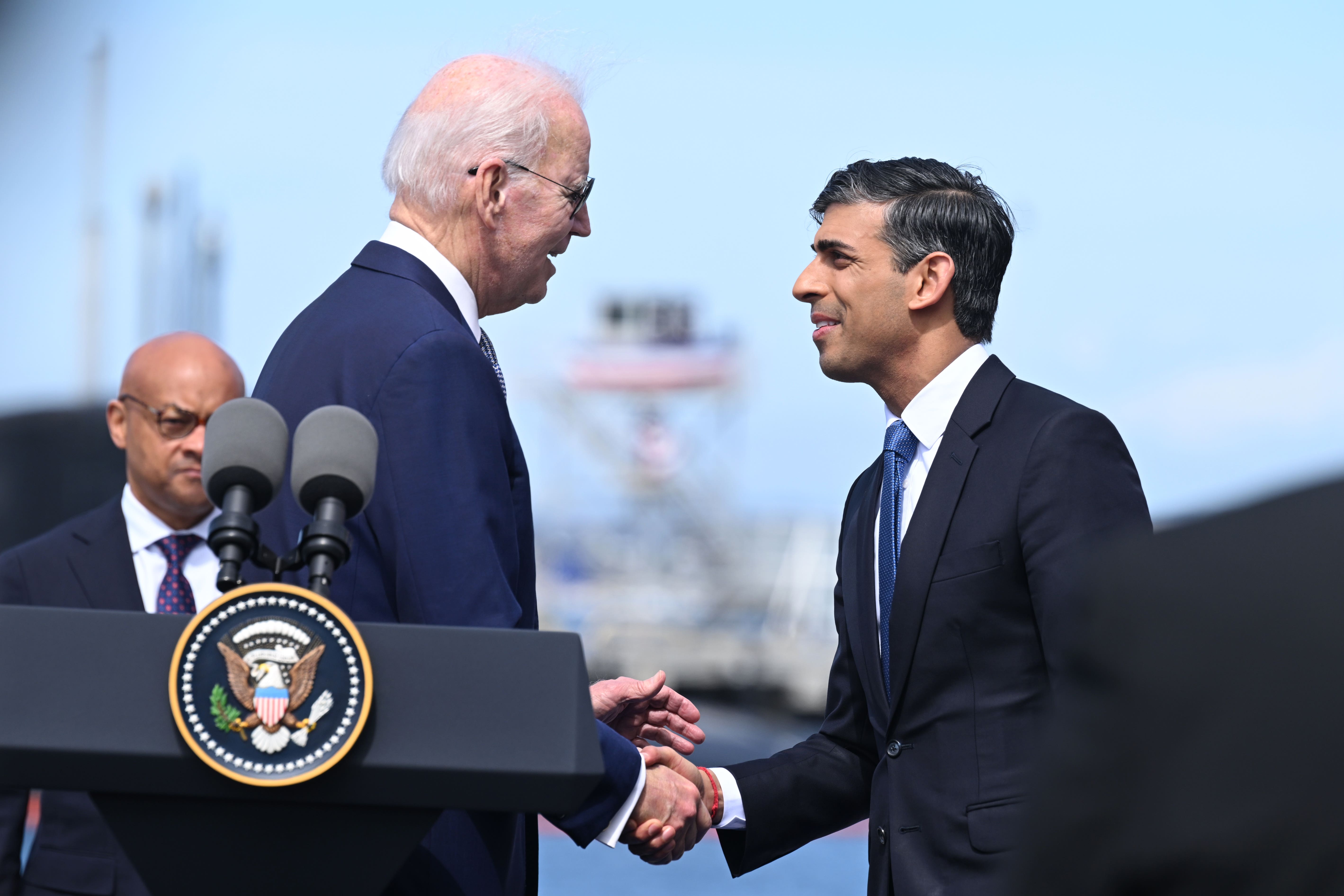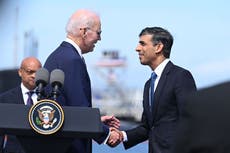Sunak’s first visit to see Biden is more a clash than a meeting of minds
For all the warm handshakes and the platitudes, the president and PM are not on the same page on the economy or AI, writes Andrew Grice


When Rishi Sunak meets Joe Biden tomorrow during his first visit to the White House as prime minister, the two leaders will have plenty of common ground. But that won’t prevent nervousness on the UK side.
Although such meetings are carefully choreographed, things can always go wrong. British officials know from bitter experience that one tiny misstep or minor disagreement will be magnified by the media into a headline-grabbing gaffe, bitter row – or, worse still, a presidential snub.
I’ve covered prime ministers on their foreign travels since Margaret Thatcher’s time. Their talks with a US president matter to them more than any other. US officials sometimes roll their eyes as they preserve the fiction of the “special relationship”; it has become a very uneven one in which the UK is viewed as a needy elderly relative whose best days have long passed.
On one US trip, I discovered that PM Gordon Brown grabbed a 15-minute meeting with a reluctant Barack Obama in the kitchen of the UN in New York as the two leaders left the building. The travelling UK pack of journalists found out, at a 2am drink I just about recalled the following morning, that Brown had made five abortive requests for a formal meeting with the US president.
In contrast, Sunak is getting the red carpet treatment, including a joint press conference – only Biden’s fifth this year. They are rare events because his aides worry that he will wander off script.
Sunak has credit in Biden’s bank after resolving the row with the EU over the Northern Ireland protocol. He has ensured that Britain is back as a serious player on the global stage after the clowning around and chaos of Boris Johnson and Liz Truss respectively.
The joke in Whitehall is: if you want to know Sunak’s instinct on a foreign policy issue, he will be on the same page as Washington. The two leaders will agree on Ukraine, moving fast up their agenda after the destruction of the Nova Kakhovka dam, and China.
But it will be harder for Sunak to achieve his goal of carving out a role for the UK in the intense debate on how to regulate artificial intelligence (AI). His government is running to catch up after a white paper in March focused on the opportunities rather than the now increasingly apparent threats.
The PM wants the UK to host an AI summit this autumn and is proposing a research body. He is scrabbling to get a seat at the table as key decisions are taken by the US, which favours a light-touch regulatory approach, and the EU, which is bringing in legally binding rules. The bad news for Sunak is, as one US source told me, “the UK is not seen here as having a meaningful role on this issue”.
Sunak’s focus on the economy during his trip is designed to compensate for the Brexiteers’ abject failure to land their much-trumpeted US-UK trade deal. The PM is talking up economic cooperation as a new version of the two countries’ historic partnership on defence. On his flight to Washington, he told journalists: “As the challenges and threats we face change, we need to build an alliance that also protects our economies. By combining our vast economic resources and expertise, we will grow our economies, create jobs and keep our people safe long into the future.” However, it is far from clear how the UK will fit into Biden’s “friend-shoring” vision of allies specialising in mutually complementary technology.
The PM will nod to the new “Washington consensus” – a more active industrial and innovation policy to combat China’s influence. But that won’t mask huge differences between their governments.
Biden’s $369bn Inflation Reduction Act of green subsidies is viewed by UK ministers as protectionist and is at odds with Sunak’s laissez-faire instincts.
The PM will seek, and might get, some protection for UK makers of electric vehicles. But for all the warm handshakes and the platitudes, the president and PM are not on the same page on the economy. Sunak has missed a trick here: a smaller-scale version of Biden’s blueprint could be branded “green levelling up” and a huge job-creation programme in the red wall heartland. But the Tories’ phobia about a pro-active industrial policy holds them and the country back. It’s out of date and out of time.
In contrast, the Labour opposition has signed up to Bidenomics, as Rachel Reeves, the shadow chancellor, made clear during her visit to Washington last month – even if Labour is now having a wobble about whether its £28bn-a-year “green prosperity plan” is compatible with its tough fiscal rules.
That Biden has more in common on the economy with Keir Starmer – who may land a White House visit later this year – than Sunak matters because minds in London and Washington will soon turn to elections expected in October and November next year respectively.
Biden and Sunak know the latter’s first visit to the White House as PM might also be his last.






Join our commenting forum
Join thought-provoking conversations, follow other Independent readers and see their replies
Comments